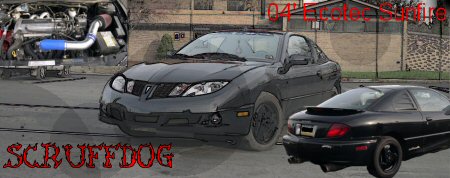took the car out for its first dyno.....with mods as listed in my profile.....torque was off but
1st run 127.6 hp
2nd run 128.9 hp
3rd run 129.6 hp
not too bad hoping to get 135-140whp when i do cams

whats the % for parasitic losses for FWD cars, manual and auto? i know for RWD, the basic assumption is 15% loss for manual trans, and 20% for autos
just wondering what you gained over the 140hp/150ftlbs factory rating
1998 Chevrolet Camaro Z28/1LE
- LS1 6speed, 3.42s
ported 5.3 heads, comp 224/228 cam, boltons
(410rwhp/390rwtq)
I believe its like 10-15%

Thanks Event I stand corrected


i always heard that FWD have less parasitic losses than RWD cars do. mostly because the trans/diff are one unit, as opposed to the extra components in a trans/diff setup in RWD cars (like the driveshaft)
so youre saying this isnt true, that both platforms share the same losses?
1998 Chevrolet Camaro Z28/1LE
- LS1 6speed, 3.42s
ported 5.3 heads, comp 224/228 cam, boltons
(410rwhp/390rwtq)
all those mods and not even 130 whp ?
what about 04 firetec who dynoed 133 whp with aem cai that's it ?. Unless you were on a mustang dyno, I think those numbers suck, personally. If you're happy, good for you.

15.958 @ 88.201 stock, still getting @!#$ty launches...
I was in fact on a Mustang Dyno

good to hear

. Any idea of what the percentage difference is from a mustang to a dynojet ? wasn't it something like 10-15 %, which would put you upwards of 140 whp and is pretty good for an auto !

15.958 @ 88.201 stock, still getting @!#$ty launches...
Mustang dynos will read about 20% lower than most other dynos because they are 99% accurate in to the wheel horsepower. The other dynos will read higher numbers than you are actually putting down. The Mustang dynos can be disappointing, but at least they aren't flattering you with a false number.
I was a retard, and now I'm permanently banned.
funny, I just saw 10% on another forum

15.958 @ 88.201 stock, still getting @!#$ty launches...
20 % is a bit unbelievable, frankly, that would mean he's pushing 160 whp (200 hp with 20% auto tranny loss!!!) on an auto with i/h/e/tb and crank pulley. I'd be more willing to believe he has about 150 whp.

15.958 @ 88.201 stock, still getting @!#$ty launches...
i gain my information from someone who dropped $120,000 on an IN-GROUND mustang awd dyno... and helped install it
I was a retard, and now I'm permanently banned.
if you go on mustangdyne.com, there's an article where they test a camaro on a dynojet and then on a mustang dyno. dynojet yields 331 rwhp, while mustang gives 315 rwhp. That's a bit short from 20 %, don't you think ?

15.958 @ 88.201 stock, still getting @!#$ty launches...







